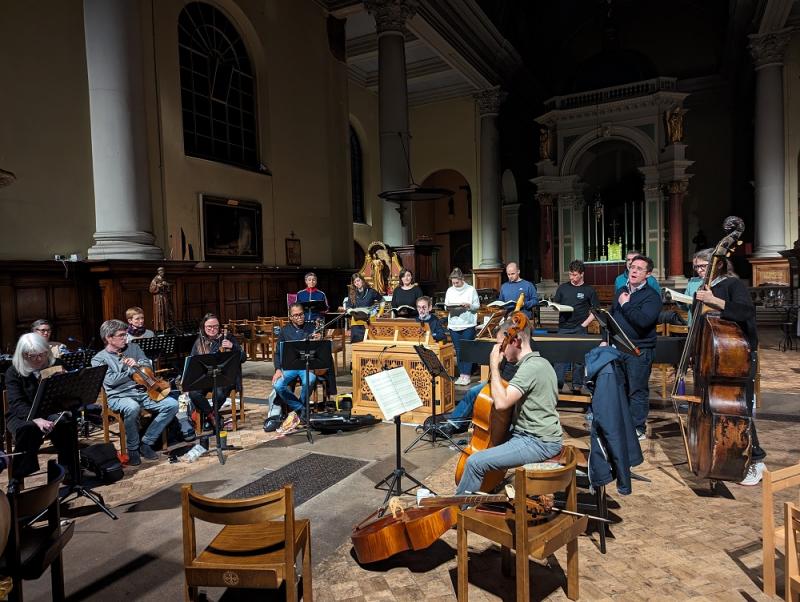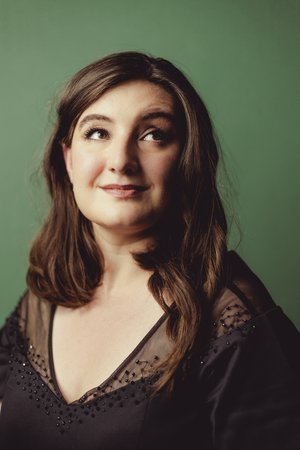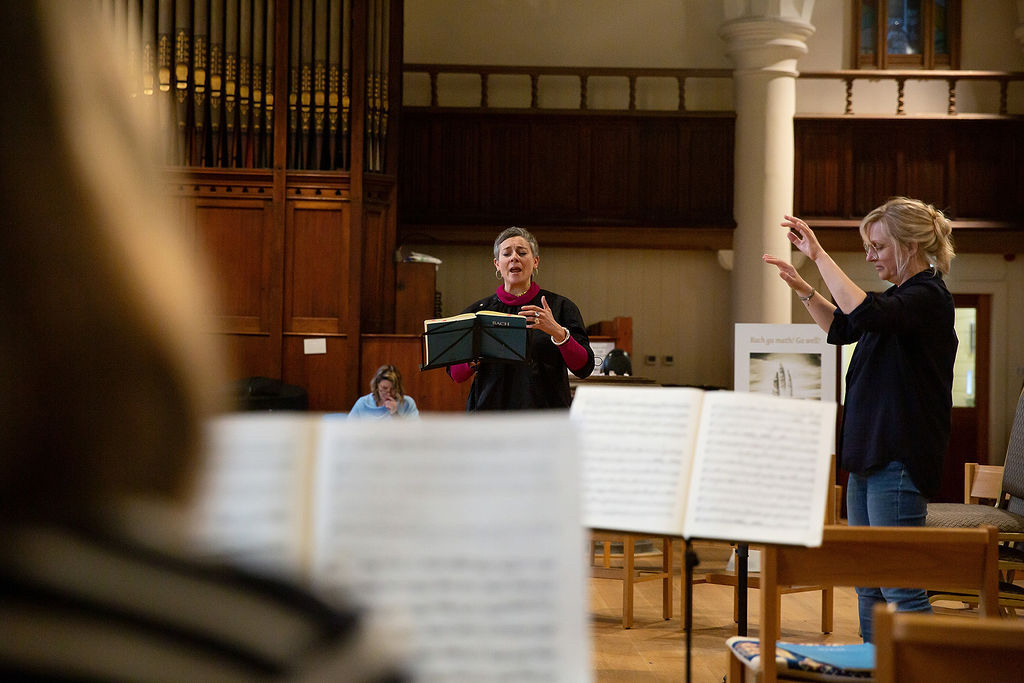Bach Passions, Dunedin Consort, Mulroy/Jeannin, St Mary's Episcopal Cathedral/Queen's Hall, Edinburgh review - twin peaks | reviews, news & interviews
Bach Passions, Dunedin Consort, Mulroy/Jeannin, St Mary's Episcopal Cathedral/Queen's Hall, Edinburgh review - twin peaks
Bach Passions, Dunedin Consort, Mulroy/Jeannin, St Mary's Episcopal Cathedral/Queen's Hall, Edinburgh review - twin peaks
Scaling the heights of Saints Matthew and John within a week

The annual St Matthew Passion from the Dunedin Consort is one the most reliably beautiful jewels in Edinburgh’s musical year. They do the St John Passion much less frequently; in fact, this is the first time I’ve heard them do it, maybe motivated by its tercentenary this year.
Doing both of the passions in the space of a week is pretty much unprecedented, however, both for the performers and for the Edinburgh audience, and experiencing both in seven days not only allowed comparisons but deepened the relationship between these complementary Bach masterpieces.
Much of that was down to the work of the directors. Tenor Nicholas Mulroy is the Dunedin Consort’s Associate Director. In one of their first, and most impressive, concerts out of lockdown in 2022, he directed the consort in the Matthew Passion without once raising a finger, doing so much hard work in rehearsal that the actual performance felt like a miracle of collective telepathy rather than a conducted concert. This year, they transferred that superpower onto the John Passion, and the result flowed like an organic improvisation, with every twitch of emotion or drop of spiritual power exploited to the max (★★★★).
Mulroy’s vision of the piece isn’t noticeably radical, but its very naturalness made it as clear as it was gripping. Every so often a performer would stand to the front of the orchestra rather than amidst the other singers so as to underline the intensity of the emotion and to increase the connection with the audience, such as in the tenor aria of remorse after Peter’s denial, or the beautiful bass/choir chorale after Jesus’ death. Most of the time, however, the soloists were drawn from the small chorus, mostly singing one-to-a-part, reinforcing the sense of this as a community collectively grieving rather than giving an organised performance.
T
Anna Dennis sang the soprano arias with all the conviction and powerful beauty that we’ve come to expect from her. That very power came to be a problem in the choruses, though. When the chorus comprises only eight singers, balance is crucially important, but Dennis’ voice dominated those of the other women, capturing the acoustic of St Mary’s Episcopal Cathedral in a way that seemed to dwarf the other singers. That’s probably an unlucky quirk of the venue more than anything else, and it lessened as the performance progressed (or did I just get used to it?). It was still rather unfortunate while it persisted, however, even if it didn’t stop the turba choruses from sounding thrilling, like being caught in musical crossfire.
The other great source of the drama was the orchestra, the thirteen players imbuing every scene with drama and onward sweep. The tangy edge to the string playing gave the music a terrific bite, reinforcing the story’s atmosphere of pain, and they rushed headlong into their runs at the approach to Golgotha, as though willing the narrative onwards. That made the softer sound of the two violas d’amore all the more poignant when they arrived in the “Erwäge” aria, and Jonathan Manson’s viola da gamba obbligato seemed to melt in the air during “Es ist Vollbracht”.
But if John was great then Matthew came close to perfection (★★★★★). Part of that may have been the altogether more welcoming acoustic of Edinburgh’s Queen’s Hall, where the blend was more secure and the balance more pleasing. There was no danger of Dennis’ voice dominating the chorus here. In fact, her voice had the freedom to soar in her arias, singing them with commanding strength as well as heart-stopping beauty, particularly in a spellbinding account of “Aus liebe”. Taylor’s alto sounded every bit as fine here, too: her “Erbarme dich” was like a pinprick of stillness in the unfolding turmoil, sounding sensational as a duet with Matthew Truscott’s solo violin which used tiny touches of vibrato to accentuate the emotional intensity.
Aside from Dennis and Taylor, all the other singers for Matthew didn’t feature in John. Joshua Ellicott sang the Evangelist with more grit and a little more strength than Mulroy, andt he was every bit as convincing as a storyteller. Matthew Brook’s Jesus is an interpretation for the ages (as affirmed recently by David Nice in reviewing a superlative Dublin Matthew Passion). It’s hard to imagine the part more sympathetically or beautifully sung: he sang with agony in the garden and even a touch of heroism before Caiphas, and overall it’s an interpretation brimming with empathy and humanity. He brought all those qualities to deeply moving performances of the last two bass arias, too.  The other four singers in the second chorus were very stylish and, importantly, clearly contrasted with the principal four. Soprano Jessical Cale and alto Sarah Campion had lighter voices but highly dramatic expression. Bass Christopher Webb sang his two arias with more bluff directness than Brook, and tenor Hiroshi Amako used his sweet, slightly reedy tenor voice to terrifically compelling effect. All of the instrumental obliggati were played with understated flair, with a special cheer for Jonathan Manson (again) in his grainy, knotty viola da gamba solo in “Komm, süßes Kreuz”.
The other four singers in the second chorus were very stylish and, importantly, clearly contrasted with the principal four. Soprano Jessical Cale and alto Sarah Campion had lighter voices but highly dramatic expression. Bass Christopher Webb sang his two arias with more bluff directness than Brook, and tenor Hiroshi Amako used his sweet, slightly reedy tenor voice to terrifically compelling effect. All of the instrumental obliggati were played with understated flair, with a special cheer for Jonathan Manson (again) in his grainy, knotty viola da gamba solo in “Komm, süßes Kreuz”.
Director Sofi Jeannin (pictured above with Anna Dennis), perhaps best known in Britain for her work as Chief Conductor of the BBC Singers, paced the whole work with a balance of reverence and dramatic thrust, with just the right sense of when to press forwards, when to relax, when to emphasise and when to hold back. This was not a performance were anything was rushed or wasted: instead it unfolded like the devotional drama that it is, a performance outstanding even by the Dunedin Consort’s standards. As the final chorus ebbed away, a weighty silence hung in the air for a good twenty seconds before anyone dared to clap It was a spell that nobody wanted to break, which might be the greatest compliment you can pay to any live performance.
Explore topics
Share this article
The future of Arts Journalism
You can stop theartsdesk.com closing!
We urgently need financing to survive. Our fundraising drive has thus far raised £49,000 but we need to reach £100,000 or we will be forced to close. Please contribute here: https://gofund.me/c3f6033d
And if you can forward this information to anyone who might assist, we’d be grateful.

Subscribe to theartsdesk.com
Thank you for continuing to read our work on theartsdesk.com. For unlimited access to every article in its entirety, including our archive of more than 15,000 pieces, we're asking for £5 per month or £40 per year. We feel it's a very good deal, and hope you do too.
To take a subscription now simply click here.
And if you're looking for that extra gift for a friend or family member, why not treat them to a theartsdesk.com gift subscription?
more Classical music
 Hallé John Adams festival, Bridgewater Hall / RNCM, Manchester review - standing ovations for today's music
From 1980 to 2025 with the West Coast’s pied piper and his eager following
Hallé John Adams festival, Bridgewater Hall / RNCM, Manchester review - standing ovations for today's music
From 1980 to 2025 with the West Coast’s pied piper and his eager following
 Kaploukhii, Greenwich Chamber Orchestra, Cutts, St James's Piccadilly review - promising young pianist
A robust and assertive Beethoven concerto suggests a player to follow
Kaploukhii, Greenwich Chamber Orchestra, Cutts, St James's Piccadilly review - promising young pianist
A robust and assertive Beethoven concerto suggests a player to follow
 Robin Holloway: Music's Odyssey review - lessons in composition
Broad and idiosyncratic survey of classical music is insightful but slightly indigestible
Robin Holloway: Music's Odyssey review - lessons in composition
Broad and idiosyncratic survey of classical music is insightful but slightly indigestible
 Classical CDs: Wolf-pelts, clowns and social realism
British ballet scores, 19th century cello works and contemporary piano etudes
Classical CDs: Wolf-pelts, clowns and social realism
British ballet scores, 19th century cello works and contemporary piano etudes
 Bizet in 150th anniversary year: rich and rare French offerings from Palazzetto Bru Zane
Specialists in French romantic music unveil a treasure trove both live and on disc
Bizet in 150th anniversary year: rich and rare French offerings from Palazzetto Bru Zane
Specialists in French romantic music unveil a treasure trove both live and on disc
 Scottish Chamber Orchestra, Ibragimova, Queen’s Hall, Edinburgh review - rarities, novelties and drumrolls
A pity the SCO didn't pick a better showcase for a shining guest artist
Scottish Chamber Orchestra, Ibragimova, Queen’s Hall, Edinburgh review - rarities, novelties and drumrolls
A pity the SCO didn't pick a better showcase for a shining guest artist
 Kilsby, Parkes, Sinfonia of London, Wilson, Barbican review - string things zing and sing in expert hands
British masterpieces for strings plus other-worldly tenor and horn - and a muscular rarity
Kilsby, Parkes, Sinfonia of London, Wilson, Barbican review - string things zing and sing in expert hands
British masterpieces for strings plus other-worldly tenor and horn - and a muscular rarity
 From Historical to Hip-Hop, Classically Black Music Festival, Kings Place review - a cluster of impressive stars for the future
From quasi-Mozartian elegance to the gritty humour of a kitchen inspection
From Historical to Hip-Hop, Classically Black Music Festival, Kings Place review - a cluster of impressive stars for the future
From quasi-Mozartian elegance to the gritty humour of a kitchen inspection
 Shibe, LSO, Adès, Barbican review - gaudy and glorious new music alongside serene Sibelius
Adès’s passion makes persuasive case for the music he loves, both new and old
Shibe, LSO, Adès, Barbican review - gaudy and glorious new music alongside serene Sibelius
Adès’s passion makes persuasive case for the music he loves, both new and old
 Anja Mittermüller, Richard Fu, Wigmore Hall review - a glorious hall debut
The Austrian mezzo shines - at the age of 22
Anja Mittermüller, Richard Fu, Wigmore Hall review - a glorious hall debut
The Austrian mezzo shines - at the age of 22
 First Person: clarinettist Oliver Pashley on the new horizons of The Hermes Experiment's latest album
Compositions by members of this unusual quartet feature for the first time
First Person: clarinettist Oliver Pashley on the new horizons of The Hermes Experiment's latest album
Compositions by members of this unusual quartet feature for the first time

Add comment